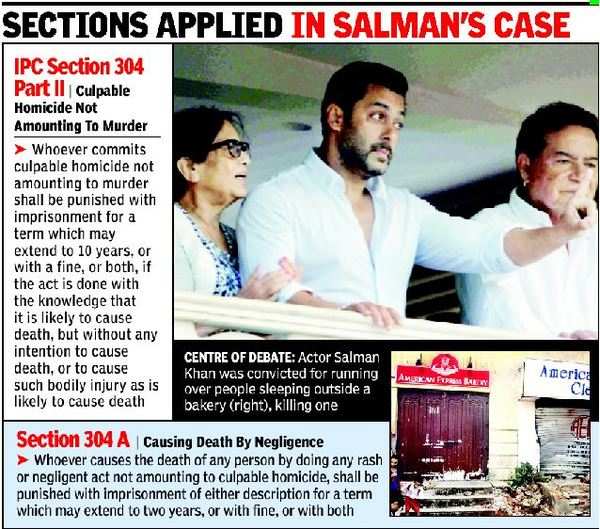- News
- entertainment
- hindi
- bollywood
- Salman Khan hit-and-run case: Culpable homicide law open to interpretation, say experts
Trending
This story is from May 10, 2015
Salman Khan hit-and-run case: Culpable homicide law open to interpretation, say experts
A day after the Bombay High Court admitted an appeal filed by actor Salman Khan and observed that the challenge to the conviction for charge of culpable homicide not amounting to murder, needs serious consideration, citizens are concerned that the trial court verdict could mean every fatal crash would attract the grave charge.

MUMBAI: A day after the Bombay High Court admitted an appeal filed by actor Salman Khan and observed that the challenge to the conviction for charge of culpable homicide not amounting to murder, needs serious consideration, citizens are concerned that the trial court verdict could mean every fatal crash would attract the grave charge.
READ ALSO: Maharashtra unlikely to challenge suspension of Salman's sentence
The trial court went by an HC ruling in the 2006 Alistair Pereira case, who mowed down seven persons asleep on a Bandra pavement. The HC had held that Pereira should have had knowledge that poor people in Mumbai sleep on the pavements and that driving rashly and in any case, under influence of alcohol, could result in their death.Trial judge D W Deshpande applied that reasoning to Khan's case since the FIR was modified to say the actor was drunk and driving at 100 kmph from Juhu to his house in Bandra.
READ ALSO: Salman’s conviction to drive traffic campaign

Though the Supreme Court had in the Uphaar tragedy case recorded Ram Jethmalani's submission that the Pereira judgment can't act as precedent, it seems to rear its head when any similar incident occurs. In the 2010 case of Nooriya Haveliwala, who lost control of her car and killed a biker, police immediately invoked section 304-II of the IPC and the trial court swiftly held her guilty in 2012, punishing her with a five-year sentence. She is on bail from the HC where her appeal is pending.
READ ALSO: Salman Khan's lawyer picks holes in case
All you want to know about Salman Khan's hit-and-run case
Advocate Majeed Memon said the law needs to be applied only after careful consideration of the facts of each case. Senior counsel Niteen Pradhan added that there is a lacuna in the law for dealing with deaths caused due to "heavy drunkenness" and hence the charge of section 304-II is applied. But he said that "it is high time the law must be amended and a section 304-B added to give enhanced punishment for deaths caused due to such drunken driving on roads." Memon said since at present, the distinction between rash and negligent and culpable homicide not amounting to murder is slim, either of the two provisions is applicable with great deal of in-depth consideration of the facts and circumstances of each case.

"The distinction between causing death by rash and negligent act as understood under section 304 A and culpable homicide not amounting to murder under section 304 Part II is very thin. The earlier is purely an act of omission, while in the latter case there is knowledge of the consequence attributed though unintended. In both cases death is caused. But in the case of 304 A it is entirely on account of total absence of care and caution, while in the case of 304 part II, although death is not caused intentionally, yet in the circumstances, the law attributes knowledge to the offender that is he ought to have known that his such act is likely to cause death of some other person," said a criminal lawyer.
READ ALSO: Salman Khan hit-and-run case diary

READ ALSO: 11 key witnesses in Salman Khan hit-and-run case
It is this "knowledge" that needs to be defined and considered carefully, said lawyers. What does amount to knowledge? A person would have knowledge that driving rashly and negligently without any caution could result in death of some passerby or a jaywalker or even another motorist. Lawyers spoken to ask whether it means that section 304-A of IPC which covers such acts, becomes redundant and wouldn't such "knowledge" be enough to slap section 304-II on errant motorists too, especially given that the Pereira judgment by the HC says knowledge of sleeping labourers on Mumbai pavements is something all would have and "imposed a legal obligation on a person to drive carefully at night".
For latest Bollywood updates follow us on Twitter >>>@TOIEntertain
For the latest in Bollywood news, like us on Facebook >>>TOIEntertain WATCH: Salman Khan's hit and run case verdict day: In pictures - TOI
READ ALSO: Maharashtra unlikely to challenge suspension of Salman's sentence
The trial court went by an HC ruling in the 2006 Alistair Pereira case, who mowed down seven persons asleep on a Bandra pavement. The HC had held that Pereira should have had knowledge that poor people in Mumbai sleep on the pavements and that driving rashly and in any case, under influence of alcohol, could result in their death.Trial judge D W Deshpande applied that reasoning to Khan's case since the FIR was modified to say the actor was drunk and driving at 100 kmph from Juhu to his house in Bandra.
READ ALSO: Salman’s conviction to drive traffic campaign
The trial court judge believed both allegations as true—that he was drunk and was driving at that reckless speed—despite the complainant, Khan's former police bodyguard also contradictorily saying in court that he covered the eight kilometer distance in half an hour. The trial court concluded Khan's guilt by holding that like Pereira, he had "knowledge" that bakery workers slept on the pavement outside the bakery on Hill Road, near his house, coupled with the knowledge that driving drunk and fast so late at night could result in a car crash.

Though the Supreme Court had in the Uphaar tragedy case recorded Ram Jethmalani's submission that the Pereira judgment can't act as precedent, it seems to rear its head when any similar incident occurs. In the 2010 case of Nooriya Haveliwala, who lost control of her car and killed a biker, police immediately invoked section 304-II of the IPC and the trial court swiftly held her guilty in 2012, punishing her with a five-year sentence. She is on bail from the HC where her appeal is pending.
READ ALSO: Salman Khan's lawyer picks holes in case
All you want to know about Salman Khan's hit-and-run case
Advocate Majeed Memon said the law needs to be applied only after careful consideration of the facts of each case. Senior counsel Niteen Pradhan added that there is a lacuna in the law for dealing with deaths caused due to "heavy drunkenness" and hence the charge of section 304-II is applied. But he said that "it is high time the law must be amended and a section 304-B added to give enhanced punishment for deaths caused due to such drunken driving on roads." Memon said since at present, the distinction between rash and negligent and culpable homicide not amounting to murder is slim, either of the two provisions is applicable with great deal of in-depth consideration of the facts and circumstances of each case.

"The distinction between causing death by rash and negligent act as understood under section 304 A and culpable homicide not amounting to murder under section 304 Part II is very thin. The earlier is purely an act of omission, while in the latter case there is knowledge of the consequence attributed though unintended. In both cases death is caused. But in the case of 304 A it is entirely on account of total absence of care and caution, while in the case of 304 part II, although death is not caused intentionally, yet in the circumstances, the law attributes knowledge to the offender that is he ought to have known that his such act is likely to cause death of some other person," said a criminal lawyer.
READ ALSO: Salman Khan hit-and-run case diary

READ ALSO: 11 key witnesses in Salman Khan hit-and-run case
It is this "knowledge" that needs to be defined and considered carefully, said lawyers. What does amount to knowledge? A person would have knowledge that driving rashly and negligently without any caution could result in death of some passerby or a jaywalker or even another motorist. Lawyers spoken to ask whether it means that section 304-A of IPC which covers such acts, becomes redundant and wouldn't such "knowledge" be enough to slap section 304-II on errant motorists too, especially given that the Pereira judgment by the HC says knowledge of sleeping labourers on Mumbai pavements is something all would have and "imposed a legal obligation on a person to drive carefully at night".
For latest Bollywood updates follow us on Twitter >>>@TOIEntertain
For the latest in Bollywood news, like us on Facebook >>>TOIEntertain WATCH: Salman Khan's hit and run case verdict day: In pictures - TOI
End of Article
FOLLOW US ON SOCIAL MEDIA








